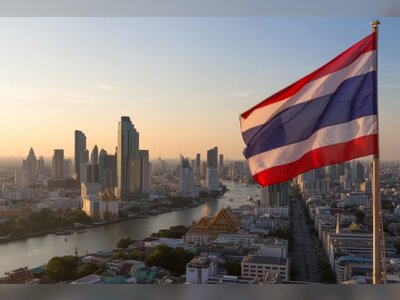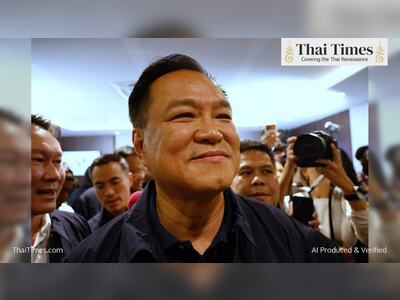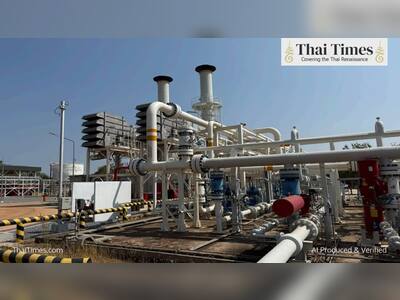
Thailand Prepares for Key Trade Talks with the United States to Address Tariff Challenges
Finance Minister highlights potential reforms to mitigate impact of 36% tariff on Thai exports
Thailand is set to revamp its import duty structure and non-tariff barriers ahead of crucial negotiations with the United States, aimed at reducing the ramifications of a 36% tariff placed on its exports.
Finance Minister Pichai Chunhavajira confirmed the government's commitment to deliver practical and feasible proposals during upcoming discussions with the U.S. Trade Representative (USTR) in Washington.
Mr. Pichai articulated a positive outlook for the talks, stating that the impending negotiations present an opportunity for Thailand to reform its trade system for mutual benefit.
He emphasized that the forthcoming proposals reflect the country's own goals, indicating that reforms are intended not solely to satisfy U.S. demands but to improve Thailand's trade practices and overall economic landscape.
In a report released by the USTR last month, a number of significant barriers to trade between the U.S. and Thailand were identified, including inadequate intellectual property protections, stringent sanitary and phytosanitary regulations, complex import licensing, and incentive issues relating to customs processes.
Following a strategic meeting, five key approaches to trade reforms were established:
Balancing Trade: Thailand currently enjoys a trade surplus of approximately $45 billion with the U.S., which is among the highest in the world.
To narrow this surplus, the government plans to bolster imports of raw materials necessary for the animal feed production sector, where corn is a primary ingredient.
Mr. Pichai noted that U.S. corn prices are competitive, which could facilitate increased imports.
Additionally, the importation of specific meat products that can be processed domestically is also under consideration.
Reducing Trade Barriers: Thailand has identified 100 U.S. imports that, despite low import taxes, face various non-tariff barriers impacting trade.
The government is committed to identifying ways to lower these barriers to enhance trade efficiency.
Addressing Non-Tariff Issues: The priority for the U.S. involves addressing non-tariff trade barriers.
Mr. Pichai highlighted the discrepancy where Thailand faces a 36% tariff despite its trade surplus, while Cambodia, with a significantly smaller surplus, is subject to an even higher 40% tariff.
Efforts to streamline procedures and eliminate redundant mechanisms are seen as avenues for improvement.
Improving Certification Processes: Stricter measures will be implemented regarding the issuance of certificates of origin, particularly for products that may be slightly modified before export.
This aims to ensure compliance and integrity in trade reporting, especially with neighboring countries.
Energy Sector Investments: Thailand is currently reliant on importing considerable volumes of natural gas annually, primarily from the Middle East.
The possibility of sourcing natural gas from the U.S. is being considered, given its lower price point compared to local sources.
Furthermore, the prospect of Thai investment in U.S. natural gas production also presents a strategic opportunity as the U.S. expands its pipeline infrastructure.
These strategic approaches are positioned to demonstrate to U.S. officials the mutual benefits of trade reform and aim to recalibrate the trade relationship between the two nations over the next decade.
Prime Minister Paetongtarn Shinawatra reiterated the need for a swift yet thorough negotiation strategy, emphasizing the protection of national interests throughout the negotiation process.
In the wake of these developments, Thailand's financial markets experienced noticeable downturns, with the benchmark SET Index declining by 4.5%, marking a new five-year low, while the baht reached its lowest level since November.
Finance Minister Pichai Chunhavajira confirmed the government's commitment to deliver practical and feasible proposals during upcoming discussions with the U.S. Trade Representative (USTR) in Washington.
Mr. Pichai articulated a positive outlook for the talks, stating that the impending negotiations present an opportunity for Thailand to reform its trade system for mutual benefit.
He emphasized that the forthcoming proposals reflect the country's own goals, indicating that reforms are intended not solely to satisfy U.S. demands but to improve Thailand's trade practices and overall economic landscape.
In a report released by the USTR last month, a number of significant barriers to trade between the U.S. and Thailand were identified, including inadequate intellectual property protections, stringent sanitary and phytosanitary regulations, complex import licensing, and incentive issues relating to customs processes.
Following a strategic meeting, five key approaches to trade reforms were established:
Balancing Trade: Thailand currently enjoys a trade surplus of approximately $45 billion with the U.S., which is among the highest in the world.
To narrow this surplus, the government plans to bolster imports of raw materials necessary for the animal feed production sector, where corn is a primary ingredient.
Mr. Pichai noted that U.S. corn prices are competitive, which could facilitate increased imports.
Additionally, the importation of specific meat products that can be processed domestically is also under consideration.
Reducing Trade Barriers: Thailand has identified 100 U.S. imports that, despite low import taxes, face various non-tariff barriers impacting trade.
The government is committed to identifying ways to lower these barriers to enhance trade efficiency.
Addressing Non-Tariff Issues: The priority for the U.S. involves addressing non-tariff trade barriers.
Mr. Pichai highlighted the discrepancy where Thailand faces a 36% tariff despite its trade surplus, while Cambodia, with a significantly smaller surplus, is subject to an even higher 40% tariff.
Efforts to streamline procedures and eliminate redundant mechanisms are seen as avenues for improvement.
Improving Certification Processes: Stricter measures will be implemented regarding the issuance of certificates of origin, particularly for products that may be slightly modified before export.
This aims to ensure compliance and integrity in trade reporting, especially with neighboring countries.
Energy Sector Investments: Thailand is currently reliant on importing considerable volumes of natural gas annually, primarily from the Middle East.
The possibility of sourcing natural gas from the U.S. is being considered, given its lower price point compared to local sources.
Furthermore, the prospect of Thai investment in U.S. natural gas production also presents a strategic opportunity as the U.S. expands its pipeline infrastructure.
These strategic approaches are positioned to demonstrate to U.S. officials the mutual benefits of trade reform and aim to recalibrate the trade relationship between the two nations over the next decade.
Prime Minister Paetongtarn Shinawatra reiterated the need for a swift yet thorough negotiation strategy, emphasizing the protection of national interests throughout the negotiation process.
In the wake of these developments, Thailand's financial markets experienced noticeable downturns, with the benchmark SET Index declining by 4.5%, marking a new five-year low, while the baht reached its lowest level since November.











